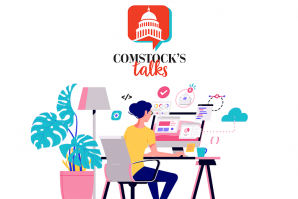To me, it feels like the past several years have been one long chain of crises. International conflicts, mass shootings, civil unrest, extreme weather and other tragedies have dominated the news, social media and public discourse.
Just when you feel like it’s safe to look at your phone, turn on your computer or watch the local news, another heartbreaking story hits.
This onslaught of devastating events, combined with the 24-hour media cycle and instant news updates accessible at any time, has put our society in danger of becoming desensitized to bad news. And this desensitization can undermine the ability of an organization to effectively communicate with its audience.
In times of crisis, CEOs, business owners, government officials and other public figures have a responsibility to effectively convey important — and sometimes life-saving — information to the public. Understanding how best to deliver that information could make or break your reputation and your organization.
Think of the CEO of BP, after the Deepwater Horizon oil rig explosion killed 11 crew members, saying “I’d like my life back.” While the sentiment may have spoken to his real, personal emotion, the statement was not the ideal tone to take when the company had just caused the largest oil spill in history, resulting in a tragic loss of life and nearly irreparable harm to the environment.
At the same time, handling a crisis well can build trust and credibility with employees, customers, the public and other stakeholders.
When seven people died from taking cyanide-laced Tylenol, Johnson & Johnson immediately stopped production, ordered a national recall, and ran ads telling people not to take the product. Within six weeks they had designed new tamper-proof packaging. The response cost millions, but it saved lives — and Johnson & Johnson’s reputation.
Of course, not every crisis is a life-or-death matter.
When KFCs in the U.K. ran out of chicken in 2018, the company ran humorous ads featuring buckets with the letters “FCK” on them, along with an apology. Burger King even took advantage of the situation, tweeting “We don’t chicken out” and offering a discount on nuggets.
Sometimes, the crisis isn’t directly related to your organization, but it still calls for a public response or statement. When your community is affected by a hate crime or natural disaster, it helps to show you understand and care about the impact of these events on those around you. This demonstration of empathy can help to ease tensions and build a sense of unity and cooperation as everyone works together to navigate difficult times.
Too often, public figures commit the most basic infractions when it comes to crisis communications. The most common mistake is to react based on an immediate emotional response, which can fan the flames and exasperate the effects of a crisis. But it doesn’t have to be that difficult.
Here are some of the steps I advise my clients to take when experiencing a crisis:
- Empathy is key. During difficult times, true leaders show genuine interest in the needs of others. Be a voice of support and offer assistance wherever possible. React sensitively to signs of stress and emotional reactions, especially in employees.
- Share information with stakeholders in a timely manner.No one wants to be left in the dark. Follow up with frequent updates.
- Communication is a two-way street. That means listening as well as speaking. Give stakeholders — employees, media, members of the public — multiple opportunities to raise concerns, ask questions and offer ideas.
- Set the right tone. A fried chicken shortage is a good time for humor. Clearly, a mass shooting is not.
- Be prepared. The best time to develop a crisis response strategy is not in the midst of a crisis. Even though most emergencies cannot, by definition, be predicted, your organization should have a basic crisis communications plan in place covering likely scenarios.
Simply put, good communication can lead to peace of mind and educated preparedness that reinforces your brand loyalty and community trust while poor communication can lead to a lack of trust, exacerbate panic and weaken confidence in your influence.
If the last few years of head-spinning events have taught us anything, it is that we should probably buckle up. How we respond to crises as a society, business, government, nonprofit or institution will determine how well we weather the unprecedented. The best way to interact with the public during a time of upheaval is to remain a reliable and trusted source of information.
Patrick Harbison is a partner at Lighthouse Public Affairs and an award-winning media professional with over 20 years of experience. Prior to joining Lighthouse, he owned Patrick Harbison Public Relations, a full-service public relations firm. A lifelong Sacramento resident, Patrick lives in Midtown with his husband Charles.
Stay up to date on business in the Capital Region: Subscribe to the Comstock’s newsletter today.
Recommended For You

How to make the fourth largest economy in the world work for women
Women Are Essential to the State Economy
Last year, the Commission on the Status of Women and Girls invested in women-specific research and produced the California Blueprint for Women’s Pandemic Economic Recovery. Here is some of what they learned.

Look Before You Launch
Before you invest in a new business idea, take advantage of resources designed to help entrepreneurs get started
So you have an idea for a business. Many
entrepreneurs operate under the premise that “if you
build it, they will come.” This is a formula for failure. Of
course you don’t want to fail! So what do you do?

Book Review: ‘The Art of Badassery: Unleash Your Mojo With Wisdom of the Dojo’
A martial artist and health coach helps women apply dojo discipline to personal life and business
Whether the opponent is an overbearing boss, financial hardship or a testy love relationship, Jennifer Cassetta shows readers how to create a roadmap for ascending beyond one’s fears, turning challenges and setbacks into superpowers.

Comstock’s Talks: Working From Home as an Extrovert
PODCAST: Guest writer Melody White reads her column about
the surprising perks of working from home as an extrovert, and
how employers and managers can support remote workers who thrive
on social interaction.




